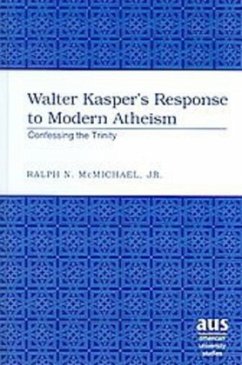The development and pervasiveness of modern atheism as well as secularization poses an acute challenge to Christian theology. Theologians have either ignored this challenge or have sought to meet it in a variety of ways. Throughout his theological career, Walter Kasper (1933-) has maintained that theology has the mutual tasks of exposition of the Christian faith and of responding to contemporary challenges to this faith. In his seminal work The God of Jesus Christ (1982), he argues that the proper Christian response to modern atheism is the confession of the Trinity. In making this response, Kasper begins to chart a course for all future Christian apologetics, for all efforts to give an account of Christian hope (1 Peter 3:15).
Bitte wählen Sie Ihr Anliegen aus.
Rechnungen
Retourenschein anfordern
Bestellstatus
Storno








